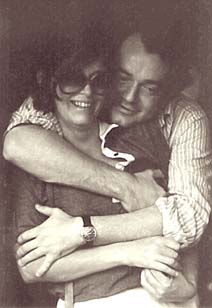|
This talk was given at the launch of John Forbes’s posthumous collection of poems Damaged Glamour in Sydney on Sunday 17 May 1998.
I’d like to start with a brief quote from Ted Berrigan’s ‘Memorial Day’. It’s a poem John liked very much — he and I played my recording of it to death whenever he visited — and it’s doubly poignant now. ‘The heart stops briefly,’ Berrigan wrote:
The heart stops briefly when someone dies, one
massive slow stroke as someone passes
from your outside life to your inside,
& then
everything continues
sanely
*
& I believe in you
Now, a bit too late for eulogies but still too early for considered reflection, I’m struck by the extent to which — for so many of us — John has yet to pass from our outside life to our inside; the extent to which ‘everything’ has yet to continue ‘sanely’. In part, that’s because, through his sense of vocation, John gave cohesion to a group of people he in no way led.
For me, John’s still in some sort of limbo whenever I read a poem I admire or one I don’t, and I can’t phone him, or whenever I visit an art gallery or skim a work of military history. And out of the blue, I was hit all over again when I recently discovered an obscure early-1960s surf song by Bob Ridgley, ‘She Was A Mau-Mau’:
‘Like wow, wow / She was a Mau-Mau // Now the years have gone by and my memory strays / Back to the jungle and those good old days...’
Shades of so many of the absurdities John revelled in, such as the Tontons Macoutes haircut from an earlier poem. And shades of the comic-book and pop cultures he trawled, amongst many others, including the classical and the theological, and synthesised through a combination of the depth of his reading and whatever seemed to be on the top of his head. I’ll never forget his explanation of what made Dion DiMucci’s ‘Runaround Sue’ such a great song.

John Forbes was more gloriously eclectic than anyone else I’ve known. And he was eclectic long before it became the catch-all, forgive-all adjective used to define if not justify any number of intellectual follies. He strip-mined imagery, or picked it up where it lay, like a beachcomber. And just as gloriously, not to mention mock-heroically, John gave his eclecticism its facetious rein. In fact I can’t think of another writer for whom facetiousness is such a strength, not even poets like Berrigan and Ron Padgett.
Those bobbydazzlers suffered too much from the Americans’ notorious — though by now surely exaggerated — inexperience with irony; why be bothered by the curve of the Pacific when it doesn’t get in the way of anything . . . when you are where you are? Irony adores a distance, be it geographical or cultural. At his best, John gave those distances immediacy.
And by what better means than facetiousness? ‘[T]he verandah is littered with copies — no, commies’ he notes in ‘Stalin’s Holidays’. ‘[Y]our embrace has crushed / my cigarettes and if / you think the best part / of breaking up cigarettes / is making them up, you’re wrong’ we’re told in ‘Civilization & Its Discontents’.
But it’s time to shift tack, because it’s all too easy to cast John as an awesomely talented poetic court jester. And John might have held court in the most colloquial sense of that phrase, but he didn’t believe poetry was seriously courtly, any more than he believed in courtly love. Poetry’s seriousness — and to John it was as serious as your life — was too scattered, and totally accessible to anyone with the ears to listen. It offered an interior democratic vista. But if irony adores distance, it also needs a point, or points, of reference. Just as perspective does in drawing, or (his poem) the ‘Four Heads & How To Do Them’ and, later, the ‘Antipodean’ one. I suspect for John that ‘Ode’ or ‘History’ in a title cued in one of classical perspective’s ‘vanishing points’.
It’s more than mere happenstance, then, that his contribution to the special issue of Southerly magazine dedicated to Memory was ‘The History of Nostalgia’. In itself — but especially in that context — it made clear just how certain John was of the fact that nostalgia is a distortion of memory. That same issue of Southerly included a wonderful essay, ‘The Past in Present Writing’, by Ivor Indyk. I’m sorry, Ivor, but I know John found the earnestness, the talk of ‘something fundamental in the human being which resists annihilation’, to be dorky (though I’m not sure that was his word). John was distrustful of even a whiff of high seriousness, but ‘The History of Nostalgia’ is not just witty and stylish; its ease is an almost surgical device as the panorama of nostalgia is allowed its glow, then denied. The poem ends with a lonely, perhaps fundamental, sense of the self, its back turned to the statue of its projected image.
Repeatedly, John’s poems give me a sense of a seriousness — and often enough of an isolation — that he seemed to feel it unwise or unhelpful to name. And reasonably so, given his poetics. There was no beating John when he wrote of vocation as nothing so much as
something you did for a bet
& now regret, like a man
walking the length of a bar on his hands
balancing a drink on his shoe
But at other times his sense of delicate balance shifted towards mawkishness, with a sense that civilization is its discontents, though to be fair that is something people indulge in in bars far more often than they walk its length on their hands.
As well, John always had trouble with those irreconcilable and fruitless (but unavoidable) debates about style versus content. When I explained a reference to Red Indian high-rise workers in a Frank O’Hara poem (for some reason the Iriquois, with no cultural need for it, had a sure-footed head for heights), John actually took offence. Who needs to know that, he asked of skyscraper-studded Manhattan’s laureate. But when Chris Wallace-Crabbe explained a Sam Browne belt to an audience in London, John took different offence (though I wonder how many people here know what one is). This was something John felt needed no explanation, especially to an audience in England, and — wait for it — Gavin Ewart was in the audience! That’s as strong a sense of cultural cringe as I ever heard John utter. But he was also amused, though also irked, by having to explain the NVA to younger audiences.
I mention these things because, as with all good poetry, there’s a network of tensions in John’s poems. And when John reconciled them, he did so in a way that was as amazing as it was seemingly casual. Just look at his home thoughts from abroad, ‘lassu in cielo’, in Damaged Glamour — perhaps someone will read it before we get down to partying. You don’t have to know who Martin Johnston and David Campbell were to appreciate it, but it’s a half- or three-quarter arsed poem if you don’t. Just as the best part of breaking up cigarettes imagery gains those extra yards if you know something, however apocryphal, about Phil Spector and the girl groups he produced.
At other times, the benefits of knowledge are more personal, but worth repeating. There are several reasons for my being so fond of ‘Love Poem’, which is literally on the cusp between New and Selected Poems and Damaged Glamour:
Spent tracer flecks Baghdad’s
bright video game sky
as I curl up with the war
in lieu of you, whose letter
lets me know my poems show
how unhappy I can be. Perhaps.
But what they don’t show, until
now, is how at ease I can be
with military technology: e.g.
matching their feu d’esprit I classify
the sounds of the Iraqui AA — the
thump of the 85 mil, the throaty
chatter of the quad ZSU 23.
Our precision guided weapons
make the horizon flash & glow
but nothing I can do makes you
want me. Instead I watch the west
do what the west does best
& know, obscurely, as I go to bed
all this is being staged for me
What can I say? Self-pity is skewered with aplomb. Pathos and bathos are both invoked but are kept separate, as though divided by a wall. There is an air of cautious bravado. The humour is less extravagant than in some other poems, but the ‘obscurely’ in ‘I know, obscurely’ pinpoints the more uncertain certainties that characterize John’s more assertive show piece poems.
And beyond that, I’d like to point to the way ‘Love Poem’ also works off John’s literariness, the sense in which just about any of his eclectic interests was grist for his poetic fundamentalism (if I said ‘mill’ I’d offend his shade). You probably don’t need to know this to appreciate the poem, but I think it helps understand the poet. In 1971 I showed John Manifold’s collection, Op. 8, to John, and one poem in particular, ‘Abyssinia and Vietnam’. There, Manifold cites Count Ciano’s description of bomb blasts seen from above as unfolding like a rose and notes that the Fascist pilot’s imagery is better applied to the white climbing rose of North Vietnamese ack-ack over Hanoi. I suspect John’s shown that poem to more of us than Chris Wallace-Crabbe has taken aside to explain the Sam Browne belt. John loved Manifold’s poem for its skill and for its gall, for its skilful bravado, and probably for its Rose. Twenty years later, I think it’s accurate to say he internalized it. Charles Olson said of Melville: ‘He was a skald; he read to write’. So too for John. The poem is personal and it is literary, but the bravado has been subsumed into something known both ‘obscurely’ and more cagily. This was John’s way: he was knowing but he was never a great knower.
And it’s because of that that we’re here today, to honour his poetry and his memory. I mentioned earlier John’s comment on that classic song of jealousy, ‘Runaround Sue’. John assured me that when Dion sings, ‘She goes out with other guys’, he could name them all.
And finally: Early last year John got the idea in his head that a higher degree would help him. He was surely correct in this, since the teaching of creative writing is full of absurdities. At any rate, he studied the by-laws of the University of Melbourne and discovered that you can get an honorary PhD ‘by acclamation’. I don’t know if he seriously believed that he could turn up at the investiture hall with a cheer squad and fast-track his doctorate, though he was capable of such a fantasy. But I do know that at the funeral, at the cemetery, at the wake, and again today he has been accorded true honour, and more than an honorary doctorate’s worth of acclamation.
|


